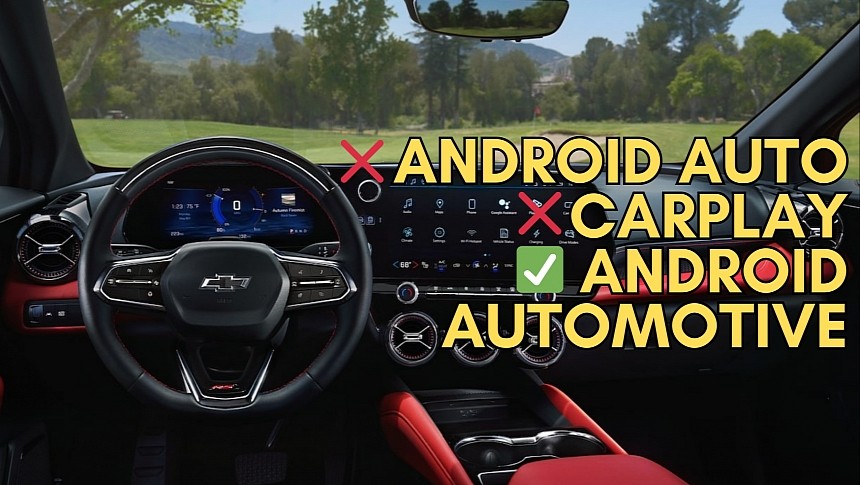Just when you thought General Motors couldn't make its departure from Android Auto and CarPlay more awful, a company executive released a statement that highlighted a ridiculous reason for leaving the two utterly popular systems behind.
Tim Babbitt, GM's product lead for infotainment, explained in an interview that driver safety has become a concern when running Android Auto and CarPlay, as the two systems are plagued by issues, including stability and dropping connections.
Due to all these glitches, drivers might be tempted to pick up their phones, including to restore the connection to the head unit. It makes sense, at some level. If you encounter a random disconnect, your first thought is to reconnect the mobile device and relaunch Android Auto and CarPlay.
However, everybody knows that GM's decision to abandon Android Auto and CarPlay has nothing to do with safety. The company is betting big on subscriptions, and moving entirely to Android Automotive paves the way for this strategy in the long term.
But invoking safety as a reason for ditching Android Auto and CarPlay is ridiculous and somewhat embarrassing for a company the size of GM. The carmaker knows it, too, so it issued a statement to explain that safety isn't the reason for dropping the two systems.
The American company says it has "valued" partnerships with Apple and Google, and it appreciates their "commitment to driver safety." In plain English, that was just poor wording, and Android Auto and CarPlay are perfectly fine from a safety perspective.
However, GM suggests it values its Android Automotive partnership a bit more, reminding of the "benefits of having a system that allows for greater integration."
General Motors has been praising this integration on several occasions, claiming that Android Automotive can offer capabilities otherwise unavailable in Android Auto and CarPlay. This is correct, as the CarPlay and Android Auto feature lineup is limited to mobile devices, with the two systems not being allowed to access vehicle information.
Android Automotive and Google services, which are available separately as GAS but are deeply integrated into the OS, can read vehicle data and provide more advanced capabilities, including battery monitoring and new voice commands.
It still doesn't serve as a good reason for banning Android Auto and CarPlay, arguably two essential features for new-car buyers. As a stand-alone operating system powering the infotainment capabilities in a car, Android Automotive can also run Android Auto and CarPlay if the carmaker permits it. Polestar has already embraced this approach, allowing its customers to choose the system they want. GM believes it knows better than its drivers, forcing everybody to stick with Android Automotive,
I can't wait to see how GM tries to defend its Android Auto and CarPlay switch, as I feel it'll be something big (and probably ridiculous, too).
Due to all these glitches, drivers might be tempted to pick up their phones, including to restore the connection to the head unit. It makes sense, at some level. If you encounter a random disconnect, your first thought is to reconnect the mobile device and relaunch Android Auto and CarPlay.
However, everybody knows that GM's decision to abandon Android Auto and CarPlay has nothing to do with safety. The company is betting big on subscriptions, and moving entirely to Android Automotive paves the way for this strategy in the long term.
But invoking safety as a reason for ditching Android Auto and CarPlay is ridiculous and somewhat embarrassing for a company the size of GM. The carmaker knows it, too, so it issued a statement to explain that safety isn't the reason for dropping the two systems.
The American company says it has "valued" partnerships with Apple and Google, and it appreciates their "commitment to driver safety." In plain English, that was just poor wording, and Android Auto and CarPlay are perfectly fine from a safety perspective.
However, GM suggests it values its Android Automotive partnership a bit more, reminding of the "benefits of having a system that allows for greater integration."
General Motors has been praising this integration on several occasions, claiming that Android Automotive can offer capabilities otherwise unavailable in Android Auto and CarPlay. This is correct, as the CarPlay and Android Auto feature lineup is limited to mobile devices, with the two systems not being allowed to access vehicle information.
Android Automotive and Google services, which are available separately as GAS but are deeply integrated into the OS, can read vehicle data and provide more advanced capabilities, including battery monitoring and new voice commands.
It still doesn't serve as a good reason for banning Android Auto and CarPlay, arguably two essential features for new-car buyers. As a stand-alone operating system powering the infotainment capabilities in a car, Android Automotive can also run Android Auto and CarPlay if the carmaker permits it. Polestar has already embraced this approach, allowing its customers to choose the system they want. GM believes it knows better than its drivers, forcing everybody to stick with Android Automotive,
I can't wait to see how GM tries to defend its Android Auto and CarPlay switch, as I feel it'll be something big (and probably ridiculous, too).









